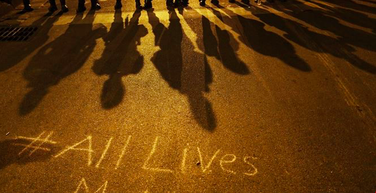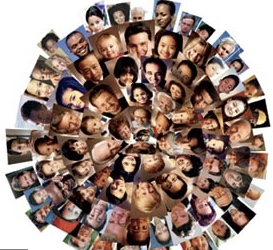 When we hear “All Lives Matter" or “Black Lives Matter," no matter who is hearing the phrase, we tend to hear it politically first, with a whole set of pre-answered assumptions about history, culture, and race, and, as well, with suspicion of some assumed social and/or political agenda behind it. We agree (cheer) or disagree (counter) depending on our own agenda, what we fear, or what we feel the need to protect (or maybe exploit). I get this. It is interesting when Jesus likened the first command to love God with all we got and have, he, then, didn't say, “and love everyone because all lives matter.” No. He was actually very specific, “Love your neighbor.” Of course, we know he didn't just mean the one living next door. Yet saying “neighbor” gave the command a specific definition, even a demographic, and yes, an assumed religious view, which, then, forced everyone to focus on “who is my neighbor?” See—upon hearing the command, it became even more specific. I believe we, that is, Christians, need to reconsider why the hashtag “Black Lives Matter” actually matters (lay aside the political organization here, BLM, and think of actual people) and that we, particularly as Christians, should embrace it. Herein is the issue—for the Christian. You see, the seemingly all-inclusive phrase “All Lives” is not necessarily, well, all inclusive anyway. “All Lives” is predicated on what one means by “Lives” and who fits within its perimeters. In early America, if the framers were to have used “All Lives Matter” instead of “all men,” you can (or should be able to) see why this matters.
Some, in arguing for and defending “All Lives Matter” over against “Black Lives Matter,” make reference that our Declaration of Independence states “all men are created equal.” Although “all” probably referenced “more than just royalty (i.e., the English monarch and royal family), Lords, and magistrates” more than likely “all" reenforced the connotation of those who were being taxed without representation—that is, the colonists in the new world—and not just Englishmen across the pond. “All” gave “men” something specific to reference. However, in the end, there is little difference between “All Lives” or (“all men”) matter and simply “Lives” (“men”) matter. You must understand, it doesn’t really matter what “All” means. Everything rests on what “Lives" (“men”) means—and this is what matters. Nonetheless, at that time, hearing what our framers had written, the hearers would, without any moral compass adjustment or contemplation, understood what was meant by “men” (i.e., “Lives”). Of course, we now affirm that “all men are created equal.” However, not “all men” (i.e., “All Lives”) were actually created equal—at that time. Between the “savages” (i.e., the Indians) referenced later in the Declaration of Independence and, even still later, in our US Constitution and Bill of Rights, that “slaves” were only partially counted (for they were property, not lives), we know that “men” actually did not mean “all living and breathing homo sapiens.” (Which negates the “all” as an inclusive adjective.) In fact, most of the references to “men” (and do notice is does say “men” and not human beings—and don't go generalizing that to them “men” meant “men and women” for it did not as a legal term nor as a socially accepted definition for a person) and the use of the word “rights” had “land-owners” in mind. It would take time for our own US Constitution and Bill of Rights to move past application to simply “land-owners” to women and children and, then, to the general population of US Citizens, and even more time to include “slaves” (i.e., free and bond black and other non-european-whites). It would take time for the idea that “men” (i.e., “Lives”) being property was understood personally and legally as immoral. So, you see, not all “Lives” (i.e., not “all men”) are, necessarily, considered “Lives.” This is why a narrow, more specific, clarifying, preceding word should be embraced. Like when Jesus said “neighbor.” When Jesus had reclined at Levi's house as the honoree of a banquet-meal, he reenforced specifically why he had come into this world. We read in Luke 5:
Please don't, as some have, spiritualize what Jesus said, twisting his words to somehow mean “everyone is a sinner, some just don't realize it.” Heavens no. While I agree “the righteous” are sinners here in this text and agree that we all fall short of the glory of God (Romans 3:23), Jesus was being very specific: “tax collectors,” those Jewish traitors working for the Romans and “sinners,” those uneducated and ignorant of the law of Moses–this are the ones here that matter. The “righteous” here would have been understood as those educated and the temple-religious elite who despised “sinners” as unclean and impure. So, here we have Jesus being specific. You see how this works. Even Jesus did it. If hashtags had existed in those days, Jesus would not have said #AllLivesMatter, but #TaxCollectorsandSinnersLivesMatter.
At this point, I am more comfortable being specific for the concept “Lives Matter.” For those fighting the good fight against abortion, as an example, this should be a no-brainer, for we understand “All Unborn Lives in the Womb Matter.” You see how that works? Thus, I am for #BlackLivesMatter and #BlackWomenLivesMatter and #Under-resourcedLivesMatter and #MyNeighborMatters (see what I did there?). The problem is with “Lives,” not with the “All” that comes before it. And, that is why we need specifics “Lives” after the “All” because it actually matters. *See previous blog post, The church is God's space to make change: #Wives/WomenLivesMatter, #ChildrenLivesMatter, and #SlavesLivesMatter.
0 Comments
 When the church, a church, or Christians align with a political agenda (right or left), there is great risk that innocent people will be put in harms way and, most certainly, whatever power is shared (between party and church et al.) is earthly power (but can be confused as God’s blessing). Perhaps this is why Jesus didn’t challenge his new flock to take over the Roman or Jewish government or defeat the High Priest or Caesar. The NT seems to present the church’s revolutionary power within a different model, a wholly other platform and venue. It is in the arena (literally) where Christians met certain death wherein the church had a platform for cultural and social change. Despite the musings of some that the early Jesus movement was a protest against an oppressive Empire, the apostolic and early church lacked the power and any public platform for social and cultural change. However, the household temple-church filled in Spirit was and is the platform for making known God’s cosmic reconciliation through which cultural and social change is inaugurated in the world, particularly the worlds of our neighborhoods and communities. The local church, that is, gathered congregations of people who identify with the Lamb who was slain and follow in the ways of Jesus, is the space where God brought and still seeks to bring about cultural and social change. Church—more so, local churches—is how God changed an empire and defeated Caesar. We need to consider this when asked, "How does Christianity address the issues pressing upon us today" or "What should Christians do to confront the issues of race, abortion, poverty, greed . . . ?" Christians did not “take to the streets,” but they made known God’s cosmic reconciliation as household temple-churches through the reoriented relationships of reciprocity as described in Ephesians 5:21-6:9. Paul called the gathered Christians, in particular Gentile Christian men (i.e., the husbands-fathers-masters), to act against their own social self-interests and against the norms of the dominant culture, literally taking up arms against the empire by adopting the reconciled, sacrificial love of Messiah Jesus, demonstrating reciprocity to wives, children, and slaves. Paul advocated the first #Wives/WomenLivesMatter, #ChildrenLivesMatter, and #SlavesLivesMatter (right there in Ephesians 5:21-6:9). The church venue was the incubator and model for systemic social change. The local church must now live “no longer as the Gentiles walk” (Ephesians 4:17). Paul did not seek to overthrow the authority structures of the culture in which the church found itself. But he does instruct the multihouseholds of God, the all-welcoming worshipping temple-church venues, in a new way of relating to one another in Messiah. This is one of the strongest arguments against homogenous churches and for multi-demographic churches. |
AuthorChip M. Anderson, advocate for biblical social action; pastor of an urban church plant in the Hill neighborhood of New Haven, CT; husband, father, author, former Greek & NT professor; and, 19 years involved with social action. Archives
February 2024
Categories
All
|
Pages |
More Pages |
|
 RSS Feed
RSS Feed